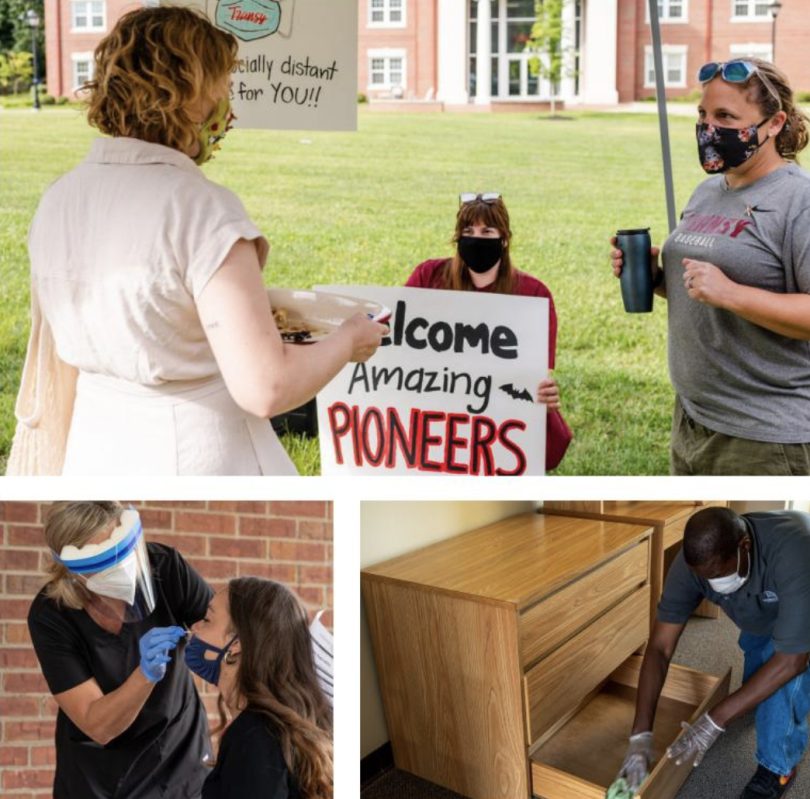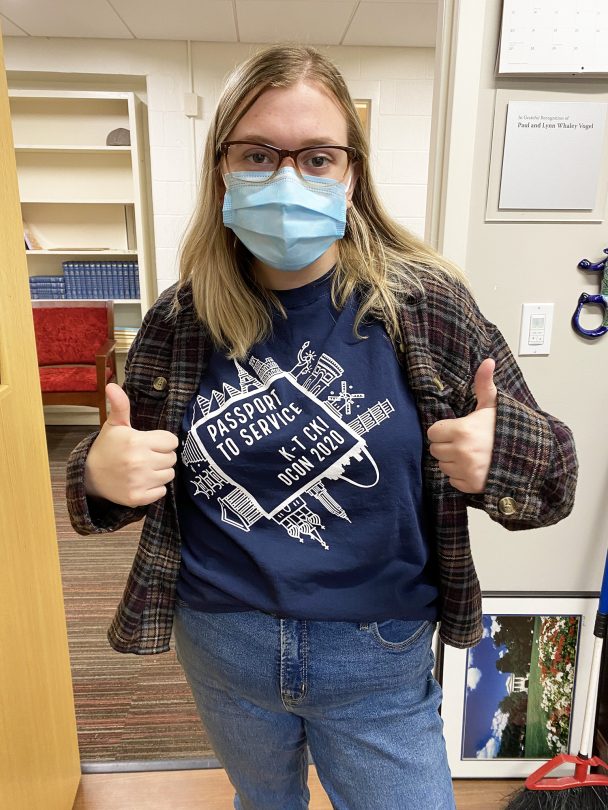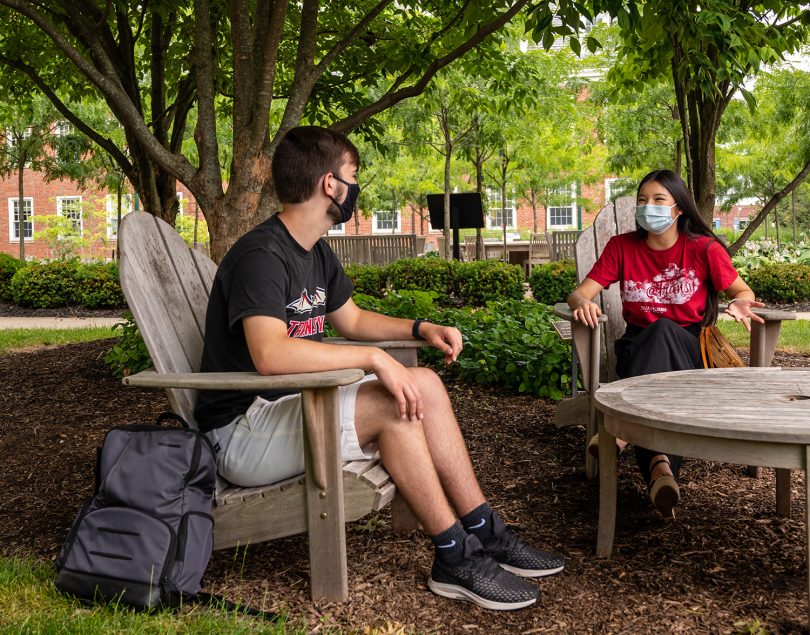
The past 16 months have tested the resolve of the Transylvania University community as its members collectively adjusted to changes brought on by the COVID‑19 pandemic. They’ve responded with resilience and perseverance, putting the health and safety of students, faculty, staff and visitors first. Thanks to their efforts — which include ongoing vaccination initiatives — the university hopes to soon be able to give students a campus experience that is as close to normal as possible. The following article, which looks back at how the school’s Student Life staff stepped up to face these challenging times, appears in the latest issue of the Third & Broadway magazine.
It was the speed that was so stunning.
By January 2020, it was clear that the virus was coming to the United States. By February, it was clear that it was going to be a real problem. By March, the whole world had changed.
“The first conversations in our office were very hopeful, thinking that we wouldn’t have to do much virtually,” says Michelle Thompson, director of campus and community engagement. “As it started progressing, we realized, no, we are going to be virtual in all of our programming efforts.”
That was the reality of the COVID-19 pandemic, which buckled nearly every facet of life during its lightning-fast spread in the U.S. By the time it took hold in Kentucky in early March, Transylvania University students were on spring break, and there were more questions than answers. Administrators made the difficult decision to close the campus and finish the winter term with students learning remotely and faculty and staff working from home.
The Office of Student Life oversees nearly every nonacademic area of the student experience, including residence life, health and wellness and campus and community engagement. Its staff members found themselves in the unenviable position of determining how to keep students connected and engaged while caring for their needs, which ranged from mental health to travel difficulties to poverty.
“We had a thousand students and a thousand unique situations,” says Jeremy Sheffield, then the director of residence life. “Very rarely can you make a policy and then be totally rigid with it. So our mantra was to treat every student as an individual.”
When you talk to folks about how Transylvania is managing the coronavirus crisis, that mantra comes up again and again. Transy prides itself on offering a personalized education in the classroom, but it’s shown over the past year that personal attention doesn’t stop there. Approximately 60 students who didn’t have the financial means to finish the year anywhere but on campus were allowed to remain. Another 15 or so stayed for the summer. The rest underwent a phased move out after spring break that allowed safe departure for those who were able to go home. Students finished out the school year, and the university held a virtual commencement ceremony for graduating seniors.
Then came the summer and the prospect that none of this was going away anytime soon. A new group of first-year students would be entering in the fall. Most of them had just endured the end of their high school careers with no graduation, no final in-person college visits and no hope for a “normal” first college experience.
So staff spent last summer figuring out how to get those students on campus safely and involved in student organizations and community engagement opportunities without really ever being able to gather in person.
“Let’s give them a piece of what Transy is like,” Thompson says.
First came housing. Transy allowed students to live on campus for the fall term if they chose to do so — and more than 500 did. The university implemented advanced cleaning protocols, mandatory masking and revamped dining services. It established isolation and quarantine halls in Poole and Rosenthal, as well as meal delivery for students who had possible and confirmed exposures and couldn’t go home.

But merely living on campus doesn’t encourage connection. So they worked with student resident advisers to teach them to reach out to their residents individually, connecting with them to talk about how their classes are going, how they’re making friends and what they need. Campus and Community Engagement staff members worked with the Student Activities Board to coordinate virtual activities like trivia and bingo; student organizations hosted a virtual involvement fair to encourage continued enrollment; and Greek organizations held no-fee virtual recruitment activities to find new members.
“It took a lot longer to develop these programs, but we still wanted them to develop those interpersonal communication skills and relationships,” Thompson says. “We did look at the length of them — before, we could do a three-hour bingo session in person, and it was nothing. Now we’re doing everything in under an hour because the module system is tough, and that’s about the length of their attention span over Zoom.”
The student organizations have done the best they can to operate somewhat normally, meeting online and coordinating events for their members. While not ideal, it has some advantages that leaders didn’t see coming. The Student Government Association, for example, has conducted all of its meetings via videoconference, which has allowed for more students to attend meetings, see how SGA operates and ask their own questions. SGA senators have adapted, focusing more on hosting student forums on topics like the temporary module system and financial aid, understanding that these are areas students have specific questions about right now.
“People have been surprisingly engaged,” says rising junior MacKenzie Sloan, an SGA senator and chair of the Constitution Committee. “More people have been interested in attending the SGA meetings — random students are curious to see what we’re doing. In person, they may not have even known that it was an option.”
This new way of operating has caused Student Life to consider even more deeply how accessibility affects the student experience. While staff members have always prioritized accessibility, never has it been more important than while students are doing a bulk of their activities online.
“Accessibility looks a lot different this year,” says Tevin Monroe, former assistant director of campus and community engagement. “It’s very much in our faces. We’re always making sure things are available to online students, that closed captioning is available, all while knowing that everyone’s not going to have a good internet connection. It’s opened my eyes to visible and invisible ways students can get counted out of things.”
Monroe helps coordinate many of the community engagement activities, many of which have been nearly impossible this year. But virtual options popped up, including online tutoring with the Carnegie Center and a virtual mentoring partnership with Kentucky Refugee Ministries, where students can help young refugees with homework and language development. And Monroe recruited student volunteers to run a voter engagement campaign to get Transy students registered to vote and help them come up with plans to cast their ballots.
“It’s important for the community’s sake that students continue meeting, to have a community of people to meet with and support each other, and our intention is to support them,” he says.
As important as it is to afford students some semblance of normalcy in an abnormal year, the number-one priority throughout the pandemic has been keeping the community safe and healthy. Transy’s Department of Student Wellbeing acquired on-campus testing equipment and hired a dedicated contact tracer. They found a HIPAA-compliant telehealth service that allowed them to offer their services remotely.
And they emphasized mental health messaging on campus and through social media, promoting virtual events like Coffee with a Counselor and YouTube yoga sessions. Transy’s coordinator of counseling services, Kathy Susman, says the number of students using Transy’s counseling services rose steadily each month as awareness grew. While students worked with counselors to combat normal college issues with anxiety and depression, Susman says they also helped students with increased experiences of isolation, loneliness and relationship concerns.

“Therapists support students with these issues in a number of ways,” she says, “drawing upon different counseling interventions, providing support, linking students to on-campus academic supports and discussing ways of gaining increased social interaction while observing the health guidelines, such as wearing masks and social distancing.”
What’s been remarkable is that, through the myriad difficulties Transy students are facing during the pandemic, they have been unusually open to complying with campus health regulations — walking around campus you’ll see them in small groups, nearly always with masks on, and sitting in the dining hall physically distanced, with a chair or two separating them. They’ve shown the kind of resilience that went from last year’s campus theme to this year’s everyday reality, making serious efforts to keep themselves and their community safe.
“I’ve been really proud of how adaptable our students have been and how compassionate they’ve been, especially toward each other, staff, faculty and the community as we’re all trying to navigate this insane situation,” says Ashley Hill, assistant dean of students and director of student well-being. “This doesn’t look like what they thought their first or last year of college would look like, but our students are so brave and strong, saying that, despite all of this, it’s going to be OK and I’m going to be OK.”
“We all love Transy,” Sloan explains. “We enjoy the curriculum, the professors, the atmosphere. Anything we can do to help keep us on campus, we’re going to do. If that’s abiding by the six-feet rule, wearing masks, sanitizing our desks — anything we can do to stay on campus, the large majority of the student body are trying to do.
“Transy is really special. We have such a tight-knit community. When we had to leave during quarantine we really missed it. We want to stay.”

